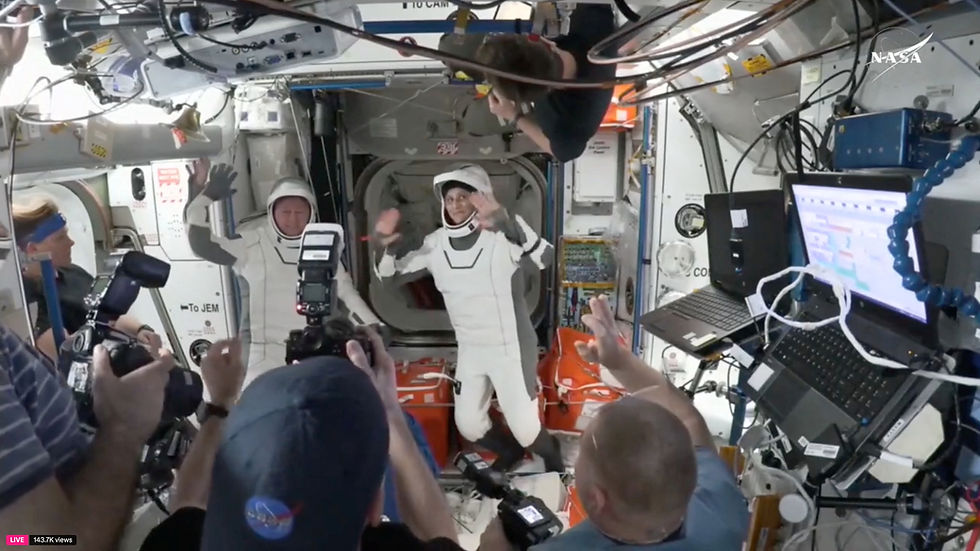Russia battles Ukrainian troops for third day after shock incursion
- News Agency
- Aug 9, 2024
- 3 min read

MOSCOW - Russian forces were battling Ukrainian troops for a third day on Thursday after they smashed through the Russian border in the Kursk region, an audacious attack on the world's biggest nuclear power that has forced Moscow to call in reserves.
In one of the biggest Ukrainian attacks on Russia since the war began in February 2022, around 1,000 Ukrainian troops rammed through the Russian border in the early hours of Aug. 6 with tanks and armoured vehicles, covered in the air by swarms of drones and pounding artillery, according to Russian officials.
Heavy fighting was reported near the town of Sudzha, where Russian natural gas flows into Ukraine, raising concerns about a possible sudden stop to transit flows to Europe.
The incursion has come as a shock to Russia, nearly 2-1/2 years after President Vladimir Putin sent his army into Ukraine.
Putin has cast the Ukrainian offensive as a "major provocation". Sergei Mironov, the leader of a Kremlin-loyal political party, called it a "terrorist attack" and "the invasion of an internationally recognised foreign territory".
Kursk's regional acting governor, Alexei Smirnov, said thousands of residents had been evacuated.
The White House said the United States - Ukraine's biggest backer - had no prior knowledge of the attack.
Pentagon spokesperson Sabrina Singh said Ukraine's move on the Kursk region was consistent with U.S. policy.
"They are taking actions to protect themselves from attacks that are coming from a region that are within the U.S. policy of where they can operate, our weapons, our systems, our capabilities," Singh told reporters.
She said Ukraine's move was not escalatory because "Ukraine is doing what it needs to do to be successful on the battlefield."
Russia's defence ministry said on Thursday that the army and the Federal Security Service (FSB) had halted Ukraine's advance and were battling Kyiv's units in the Kursk region.
"Units of the Northern group of forces, together with the FSB of Russia, continue to destroy armed formations of the Armed Forces of Ukraine in the Sudzhensky and Korenevsky districts of the Kursk region, directly adjacent to the Russian-Ukrainian border," the ministry said.
The Ukrainian military has remained silent on the Kursk offensive, though President Volodymyr Zelenskiy praised the Ukrainian army on Thursday for its ability "to surprise" and achieve results. He did not explicitly reference Kursk.
Some Russian bloggers said Ukraine's forces were pushing towards the Kursk nuclear power station, which lies about 60 km (37 miles) northeast of Sudzha.
Yuri Podolyaka, a popular Ukrainian-born, pro-Russian military blogger, said that there were intense battles about 30 km from the Soviet-era nuclear plant, which supplies a large swathe of southern Russia with power.
CRITICAL JUNCTURE
Ukraine's energy minister said gas transit via Sudzha was functioning, despite reports of hostilities there. Most EU nations have reduced dependence on Russian gas, but Austria still receives most of its gas via Ukraine.
The Center for Information Resilience (CIR), a non-profit open-source analysis organisation, said it was unable to visually confirm any damage to the gas metering station as a result of the incursion, but had verified significant damage to the border checkpoint about 500 metres (550 yards) to the south.
"This, combined with footage verified by CIR of several Russian soldiers surrendering to Ukrainian soldiers near the entrance of the gas metering plant, makes it likely that the plant has been affected by the Ukrainian incursion, however, the level of damage cannot be verified at this time," it said.
The battles come at a crucial juncture in the conflict, the biggest land war in Europe since World War Two. Kyiv is concerned that U.S. support could weaken if Republican Donald Trump wins the November presidential election.
Trump has said he would end the war, and both Russia and Ukraine are keen to gain the strongest possible bargaining position on the battlefield.
Ukraine wants to pin down Russian forces, which control 18% of its territory, though the strategic significance of the border offensive was not immediately clear.
Former Russian President Dmitry Medvedev said the Ukrainian attack was an attempt to force Moscow to divert resources from the front and to show the West that Ukraine could still fight.
As a result of the Kursk attack, Medvedev said, Russia should expand its war aims to include taking all of Ukraine.
He said Moscow's "Special Military Operation" should acquire an "openly extraterritorial character", with Russian troops moving on Odesa, Kharkiv, Dnipro, Mykolayiv, Kyiv "and beyond".

















.png)








Comments